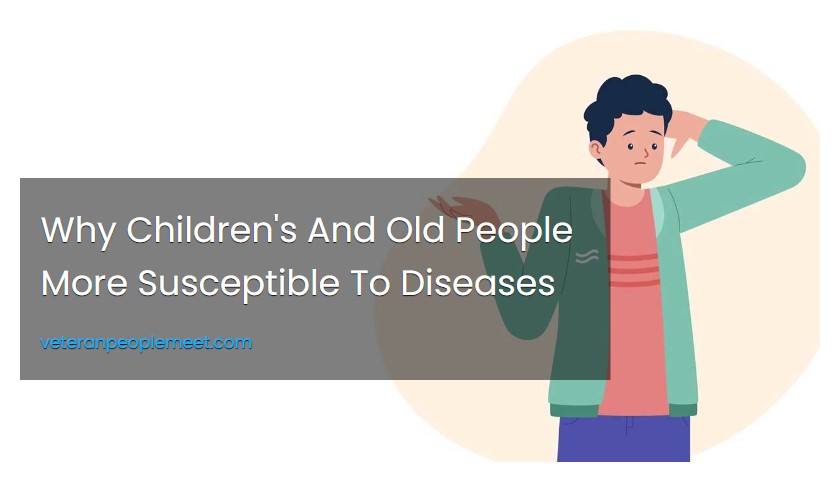Why Children's And Old People More Susceptible To Diseases

The vulnerability of children and the elderly to illness can be attributed to the development and weakening of their immune systems. Children's immune systems are still in the process of maturation, while the elderly's immune systems have declined over time. As a result, they may be more susceptible to infection and disease.
How do age-related changes to the body make older individuals more susceptible to illnesses?
As individuals age, their immune system undergoes several changes that impact its ability to function optimally. Notably, the immune system becomes slower to respond, increasing the risk of acquiring illnesses. Furthermore, vaccines may not work as effectively or offer protection for extended periods as expected. Additionally, aging increases the potential for an autoimmune disorder to arise, further compromising the immune system's effectiveness. Thus, processing these changes and taking steps to mitigate their impacts is essential for maintaining good health as one ages.
What factors affect the health of an older body?
The aging process introduces significant changes and vulnerabilities to the body, including the brain as an organ. Illnesses, medications, and life events are stressors that can push the body to work harder and contribute to changes in health status. It is important to understand these age-related changes to better support the health and well-being of older adults.
How does the body change with aging?
Aging is a natural process that leads to changes in cells and organs, causing them to function less effectively and ultimately leading to cellular death. These changes affect the body's appearance and overall functioning. It is important to understand these changes in order to properly address the unique health concerns of older individuals.
Why do some organs function less well as people age?
As the human body ages, its cells gradually lose their functionality, leading to decreased organ efficiency. Additionally, certain organs, such as the testes, ovaries, liver, and kidneys, experience a decline in the number of cells, further impairing their ability to function normally. When the cell count becomes too low, it can compromise the operation of the organ, resulting in decreased overall health and wellness. Overall, most organs in the body are subject to declining performance as a person ages.
Do diseases of aging affect the occurrence of infections?
The susceptibility of aging individuals to infection is a notable concern, with well-known diseases of aging often overshadowing this issue. Cell-mediated immunity, a crucial part of the immune response, becomes less efficient as a person ages, exacerbating this susceptibility. Despite this decline, it is not the sole contributing factor, and more research is needed to better understand the complexities of how aging affects immune function.
Are there any genetic factors that can make children and older individuals more susceptible to certain diseases?
Inherited genetic disorders such as sickle cell anemia, cystic fibrosis, and early-onset Alzheimer's are caused by specific genetic mutations passed down from parents. On the other hand, some genetic variations simply affect a person's susceptibility to developing a specific disease. These variations can either increase or decrease the likelihood of acquiring a disease, but they do not necessarily dictate if an individual will develop the ailment. It is important to understand the genetic risk factors associated with diseases to take proactive steps towards prevention and management.
Do inherited diseases require both parents to contribute?
It is increasingly common for individuals with a family history of genetic diseases to undergo genetic testing before having children in order to determine their risk of passing on the disease. Some inherited diseases only require one parent to contribute the gene, while others require both parents to contribute one. Understanding genetic predisposition is crucial for making informed decisions about family planning and managing the health of affected individuals. By identifying the genetic basis of a disease, individuals can take proactive measures to mitigate the risk of passing on the disease to future generations.
Do genetic factors influence neurocognition across childhood and early adulthood?
In conclusion, the impact of genetic factors on neurocognition during various stages of development is a complex and overlapping process. It is crucial to investigate the interaction of genes and age on changes in cognitive development to identify the genetic basis of cognitive development. Understanding the factors that influence cognitive development can aid in developing better interventions and therapies for individuals with cognitive impairments.
Does a genetic predisposition cause a disease?
A genetic predisposition is an inherited susceptibility that can increase the likelihood of developing a specific disease or condition. It does not qualify as a direct cause of the disease, rather it indicates that with the right environmental and lifestyle factors, the individual is more likely to experience it. It is important to understand that a genetic predisposition does not necessarily mean that the disease will develop in all cases. It is merely a signpost for identifying individuals who should be more vigilant with regard to preventive measures and early detection when necessary. By recognizing and understanding one's genetic predispositions, individuals can take proactive steps to minimize the risk and improve their overall health outcomes.
Do people have the genetic potential to survive into old age?
There is an article "Live Long and Proper: Genetic Factors Associated with Longevity" reveals the findings of a study conducted by researchers on the genetic factors associated with living a longer life. The study found that certain genetic signatures are linked to longevity, including variations in genes involved in DNA repair, metabolism, and cell growth. Surprisingly, approximately 15 percent of control subjects also possessed this genetic signature, suggesting that more factors beyond genetics may contribute to a longer life. The study sheds light on the importance of understanding the genetic factors that play a role in aging and longevity.





